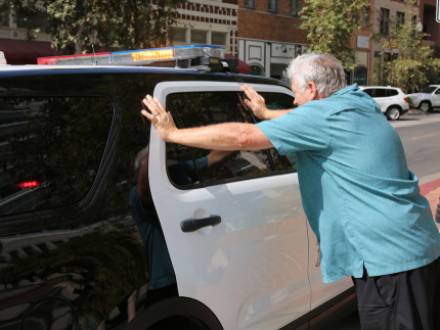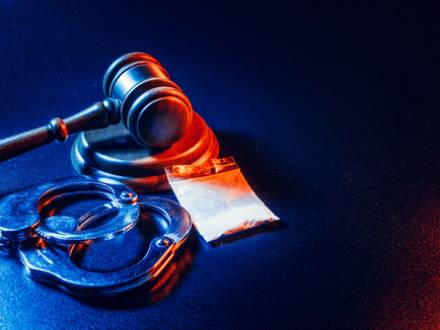Recent Blog Posts
Texas SB 3 Veto: What It Means for THC, Hemp Products, and Marijuana Laws
 This past weekend, Governor Greg Abbott vetoed Senate Bill 3 (SB 3), a high-profile piece of legislation that would have banned most consumable hemp-derived THC products in Texas. While this decision was a relief to many in the hemp and cannabis-adjacent industries, it has also raised questions about what the law would have done and what Texans still need to know about THC and marijuana legality. Contact our Tarrant County marijuana charge defense attorney to learn more.
This past weekend, Governor Greg Abbott vetoed Senate Bill 3 (SB 3), a high-profile piece of legislation that would have banned most consumable hemp-derived THC products in Texas. While this decision was a relief to many in the hemp and cannabis-adjacent industries, it has also raised questions about what the law would have done and what Texans still need to know about THC and marijuana legality. Contact our Tarrant County marijuana charge defense attorney to learn more.
What Would SB 3 Have Made Illegal?
SB 3, which passed both chambers of the Texas Legislature with strong support, proposed sweeping restrictions on hemp-derived products. Specifically, it would have:
What to Do After a DWI Arrest in Tarrant County
 Being arrested for driving while intoxicated (DWI) in Tarrant County can be a frightening and confusing experience. Whether this is your first offense or not, what you do immediately after the arrest can significantly impact your freedom and your future.
Being arrested for driving while intoxicated (DWI) in Tarrant County can be a frightening and confusing experience. Whether this is your first offense or not, what you do immediately after the arrest can significantly impact your freedom and your future.
At The Dameron Law Firm, our Tarrant County DWI defense attorney helps people in Fort Worth understand their rights after being charged with a DWI. If you or a loved one has been arrested, here is what you need to know.
What Are Your Rights After a DWI Arrest?
After an arrest, you have the right to remain silent and the right to an attorney. You should be respectful and cooperative with law enforcement, but do not answer questions beyond your name and basic identifying information. Politely ask to speak with a lawyer and do not discuss the case further without counsel present.
How Marijuana Charges Are Handled in Fort Worth Courts in 2025
 As of 2025, weed laws in Texas remain complex and often misunderstood. Despite growing national trends toward legalization, marijuana possession and distribution are still criminal offenses in Texas. If you are facing marijuana charges in Fort Worth, you need to understand how local courts handle these cases and what legal options you may have. You do not have to do this alone; our Tarrant County, TX drug crimes defense lawyer is here to help you.
As of 2025, weed laws in Texas remain complex and often misunderstood. Despite growing national trends toward legalization, marijuana possession and distribution are still criminal offenses in Texas. If you are facing marijuana charges in Fort Worth, you need to understand how local courts handle these cases and what legal options you may have. You do not have to do this alone; our Tarrant County, TX drug crimes defense lawyer is here to help you.
Texas Marijuana Laws in 2025
While many states have legalized marijuana for recreational or medical use, Texas law continues to classify most marijuana-related offenses as criminal. Under the Texas Controlled Substances Act, marijuana is considered a Schedule I substance, meaning it has a high potential for abuse and no accepted medical use under state law.
Top 5 Mistakes to Avoid When Facing Criminal Charges
 If you have recently been arrested, you are not alone. These cities report some of the highest arrest rates in Tarrant County each year. But while arrests are common, the stakes are always personal, and making the wrong move early in your case can have serious consequences.
If you have recently been arrested, you are not alone. These cities report some of the highest arrest rates in Tarrant County each year. But while arrests are common, the stakes are always personal, and making the wrong move early in your case can have serious consequences.
At The Dameron Law Firm, our Fort Worth, TX criminal defense attorney understands the local courts, prosecutors, and police departments. Here are the top five mistakes to avoid if you are facing criminal charges.
Talking to Police Without a Lawyer
Whether you have been arrested by local or state deputies, officers may try to get a statement before you have spoken with an attorney. Do not fall for this tactic. Exercise your right to remain silent and request legal representation immediately. The Fifth Amendment protects you from self-incrimination.
How Much Alcohol is Too Much to Drive in Texas?
 When it comes to DWI (Driving While Intoxicated) charges in Texas, one of the most common questions we hear at The Dameron Law Firm is: How much alcohol does it take to be considered legally intoxicated? The answer depends on several factors — including your BAC (blood alcohol concentration), the time of driving, and even the timing of your blood test. Our Texas DWI defense attorney can help you understand the charges against you and what the options may be for building a tough defense.
When it comes to DWI (Driving While Intoxicated) charges in Texas, one of the most common questions we hear at The Dameron Law Firm is: How much alcohol does it take to be considered legally intoxicated? The answer depends on several factors — including your BAC (blood alcohol concentration), the time of driving, and even the timing of your blood test. Our Texas DWI defense attorney can help you understand the charges against you and what the options may be for building a tough defense.
What Is the Legal Limit for Alcohol in Texas?
Texas law defines intoxication in two main ways under Texas Penal Code § 49.01(2):
-
Loss of mental or physical faculties due to alcohol, drugs, or another substance
Understanding Administrative License Revocation (ALR) Hearings After a Texas DWI Arrest
 If you've been arrested for Driving While Intoxicated (DWI) in Texas, you may be facing an Administrative License Revocation (ALR)—a separate civil process that can suspend your driver’s license, regardless of the outcome of your criminal case. ALR hearings are governed by Texas Transportation Code Sections 524 and 724, and they are one of the first legal hurdles after a DWI arrest. A Fort Worth, Texas criminal defense attorney can help you protect your rights and understand your options.
If you've been arrested for Driving While Intoxicated (DWI) in Texas, you may be facing an Administrative License Revocation (ALR)—a separate civil process that can suspend your driver’s license, regardless of the outcome of your criminal case. ALR hearings are governed by Texas Transportation Code Sections 524 and 724, and they are one of the first legal hurdles after a DWI arrest. A Fort Worth, Texas criminal defense attorney can help you protect your rights and understand your options.
What Triggers an ALR Hearing?
The Texas Department of Public Safety (DPS) will initiate an ALR proceeding if:
-
You refuse to submit to a chemical test (blood or breath), or
-
You fail the test by providing a blood alcohol concentration (BAC) of 0.08 percent or higher.
What if I was Arrested for DWI When I Was Not Drunk?
 Being arrested for driving while intoxicated (DWI) is a serious matter, but what if you were not drunk when you were pulled over? Many people assume that DWI charges are only filed when someone is clearly impaired, but law enforcement officers can and do make mistakes. From inaccurate field sobriety tests to faulty breathalyzer results, there are several reasons why you might be wrongfully accused of DWI. In such situations, a qualified Texas criminal defense lawyer can explain your rights and legal options.
Being arrested for driving while intoxicated (DWI) is a serious matter, but what if you were not drunk when you were pulled over? Many people assume that DWI charges are only filed when someone is clearly impaired, but law enforcement officers can and do make mistakes. From inaccurate field sobriety tests to faulty breathalyzer results, there are several reasons why you might be wrongfully accused of DWI. In such situations, a qualified Texas criminal defense lawyer can explain your rights and legal options.
How Do False DWI Arrests Happen?
You can find yourself facing DWI charges even if you were sober for a variety of reasons.
Inaccurate Field Sobriety Tests
Police officers use field sobriety tests like the walk-and-turn and the horizontal gaze nystagmus test to determine whether a driver is impaired. However, results indicating that a driver is intoxicated can sometimes be explained by valid reasons other than intoxication, including various medical conditions, fatigue, or even nervousness.
Can I Be Charged with Drug Possession if the Drugs Were Not Mine?
 Did you know that in Texas, you can face drug possession charges even if the drugs found were not actually yours? Understanding how Texas law defines possession is critical if you are accused of it. A qualified Texas criminal defense lawyer with experience fighting these types of charges can explain your options and advocate for a favorable outcome.
Did you know that in Texas, you can face drug possession charges even if the drugs found were not actually yours? Understanding how Texas law defines possession is critical if you are accused of it. A qualified Texas criminal defense lawyer with experience fighting these types of charges can explain your options and advocate for a favorable outcome.
How Does Texas Law Address Drug Possession?
Under Texas law, possession is defined as having "care, custody, control, or management" of a controlled substance. You do not have to physically have drugs in your hand or pocket to be charged. Prosecutors can argue that you had access to or control over the drugs even if they were not yours.
How Can Innocent People Face Drug Possession Charges?
There are several scenarios that can result in a wrongful accusation of drug possession:
What to Know About the Controversial Affluenza Defense in Texas
 In 2013, a teenager in Texas who faced charges for killing four people in a drunk driving accident gained national attention when his defense used his wealthy upbringing and privilege as a mitigating factor. Otherwise known as the affluenza defense, the defendant’s lawyers claimed that the sense of entitlement he was raised with led him to lack the ability to understand the consequences of his actions. The defendant in this 2013 case ended up sentenced to probation, which sparked outrage and encouraged broader dialogue about how wealth and privilege can impact criminal justice, especially in Texas.
In 2013, a teenager in Texas who faced charges for killing four people in a drunk driving accident gained national attention when his defense used his wealthy upbringing and privilege as a mitigating factor. Otherwise known as the affluenza defense, the defendant’s lawyers claimed that the sense of entitlement he was raised with led him to lack the ability to understand the consequences of his actions. The defendant in this 2013 case ended up sentenced to probation, which sparked outrage and encouraged broader dialogue about how wealth and privilege can impact criminal justice, especially in Texas.
Another interesting aspect that the affluenza defense has brought up is that defense lawyers can use creative thinking in creating their criminal defense strategies. While the affluenza defense is not likely to be broadly used, the idea of thinking outside the box to defend a client’s rights is always relevant. Regardless of your charges, a creative and knowledgeable Texas defense lawyer can review your case and build a defense that is well-suited to your specific needs and background.
Can I End Up in Prison if Someone Else Gives Me Stolen Property?
 If you think about someone being charged with theft, you likely imagine that person took something that was not theirs. But did you know that in Texas, you could also face theft-related criminal charges if you did not steal anything but received something stolen by someone else?
If you think about someone being charged with theft, you likely imagine that person took something that was not theirs. But did you know that in Texas, you could also face theft-related criminal charges if you did not steal anything but received something stolen by someone else?
Many people mistakenly think that if they did not actively steal anything, they would not get into any legal trouble for the theft. However, if anything that was stolen is found in your possession, you could end up facing serious consequences. A knowledgeable Texas criminal defense lawyer can explain the laws and build a solid defense to protect your rights.
What Does Texas Law Say About Receiving Stolen Property?
According to Texas law, theft is when someone illegally comes to possess something with the intention of depriving its rightful owner of it. If you have something you know was stolen, it is considered theft even if you are not the one who stole it. In such cases, you could face the same theft charges as someone who actively stole the item.

 817-222-0624
817-222-0624







